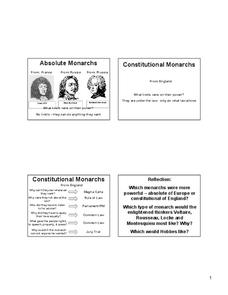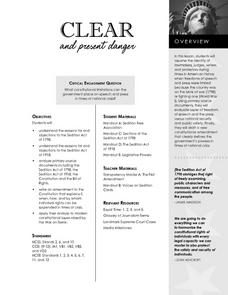Curated OER
Supreme Court June 2010 Decisions Wrap-Up
Students consider constitutional rights. In this Bill of Rights lesson, students complete an activity guide that requires students to examine Bill of Rights-related cases of 2010. Students respond to discussion questions pertaining to...
Curated OER
The Alien and Sedition Acts
Young scholars discover the conflicts that arose between the political parties over issues of foreign policy and economics. Using the Internet, they research the Alien and Sedition Acts and how they relate to the U.S. Constitution. They...
Curated OER
Divided We Fall
Students examine the Bill of Rights. In this U.S. Constitution lesson plan, students write essays for perform plays that feature the importance of the first ten amendments. Students imagine the United States without 1 of the amendments...
Curated OER
Supreme Court in Our Lives: Key Cases
Pupils analyze Supreme Court decisions and their effect on students. They discuss current events realted to the U.S. Constitution and review cases that impact pupils. They identify each case with its facts, issues, and arguments.
Heritage Foundation
Congress's War Powers
Declaring war is not as easy as some may think. High schoolers learn about Congress's limits regarding war by reading important clauses in the US Constitution. Various independent and collaborative activities reinforce learning, making...
Curated OER
Supreme Court Decisions and Their Effect On Us
Consider five Supreme Court cases and how their outcomes have directly affected the American population. Government students research and compose a 1-2 page pager outlining the examples of our daily life that have specifically been...
Curated OER
Supreme Court Case Study: District of Columbia Vs Heller
Examine the Supreme Court case, District of Columbia vs Heller, to build a better understanding of the Bill of Rights. Learners visit three different websites, read the provided informational text, and then answer a series of critical...
National Endowment for the Humanities
Background on the Patriot Attitude toward the Monarch
Learners explain the Patriot attitude toward the British monarchy, which helps them embrace the Founders' reluctance to have a strong executive under the Articles of Confederation as well as their desire to build in checks of executive...
Curated OER
Advise And Consent Lesson 1: Limits of Power
Students examine the importance of citizens being involved in their community government for the common good. They look at the importance of limiting government and the concepts of philanthropy.
Curated OER
Absolute Monarchs and Constitutional Monarchs
In this absolute monarchs and constitutional monarchs study guide worksheet, students read a brief overview pertaining to the topic and then respond to a reflection question.
Curated OER
Michigan Constitution and the Legislative Branch
Young scholars explore online resources to compare and contrast the different constitutions the state of Michigan has had. They continue their exploration of various websites, focusing on the legistlative branch and the homepage of their...
Heritage Foundation
Congress's Economic Powers
Join Congress as they assess their economic abilities for spending—and as they discover their limits. High schoolers use an educational resource to explore Congress's economic powers and learn to apply these concepts to their everyday...
Curated OER
Clear and Present Danger
Learners assume identities of lawmakers, judges, writers, and protestors during times in American history when freedoms of speech and press were limited because country was on the brink of war or fighting one. Students use primary source...
Curated OER
Create Your Own Constitution
Eighth graders explore the processes, purpose and components of a good and just constitution. They focus on the Constitution of the United States of America. Students discuss the purpose of a constitution and reasons why the Constitution...
Curated OER
Documents and Symbols and American Freedom
Students complete a unit of lessons on the documents, symbols, and famous people involved in the founding of the U.S. government. They create a personal bill of rights, write a found poem, design a flag, conduct research, and role-play...
Curated OER
Are We Free Yet?
Students read excerpts from several Freedom Documents, evaluate amount of freedom guaranteed by each document, and rank documents on scale to determine which grant greatest and least amount of personal freedom.
Curated OER
A Constitution for Alaska
Students read sections cited from the Governing Alaska unit. They discuss factors that made Alaskans push for statehood. They view video A Constitution for Alaska.
Minnesota Center for Community Legal Education
Minnesota v. Hershberger
Freedom of religion has been a controversial, yet fundamental, tenet of the United States since even before the nation's birth. In a well-constructed lesson, the class compares the Minnesota Constitution to the US Constitution as a means...
James Madison Memorial Fellowship Foundation
A Picture is Worth a Thousand Words
This exercise on the Constitution requires small groups to design a visual metaphor that expresses the concept behind one of seven principles: popular sovereignty, federalism, republicanism, separation of powers, checks and balances,...
Curated OER
The Role of the Executive Branch in the Lawmaking Process
Students examine Article I, Section 7, and Article II, Sections 2 and 3, of the U.S. Constitution, explain the president's role in the lawmaking process, and define the term veto.
Library of Congress
The Emancipation Proclamation and the Thirteenth Amendment
How did the Emancipation Proclamation lead to the Thirteenth Amendment? Middle schoolers analyze primary source documents including the text of the Emancipation Proclamation, political cartoons, photographs, and prints to understand the...
School Improvement in Maryland
Supreme Court Case Overview I
As part of a study of the 14th Amendment to the United States Constitution, class members examine four Supreme Court decisions—Gitlow v. New York, Mapp v. Ohio, Gideon v. Wainwright, and Griswold v. Connecticut—that incorporated the due...
National Endowment for the Humanities
The 1828 Campaign of Andrew Jackson: Expansion of the Voting Base
Students give examples to indicate how the franchise was extended and limited in the first half of the 19th century, and cite some differences in the newly enfranchised population that could affect the way they would vote.
Redefining Progress
Have and Have-Not
Is there a correlation between a country's wealth and the extent of its ecological footprint? What exactly constitutes an ecological footprint, and how does one country stack up against the rest? This is a unique instructional activity...

























